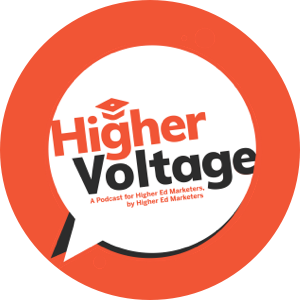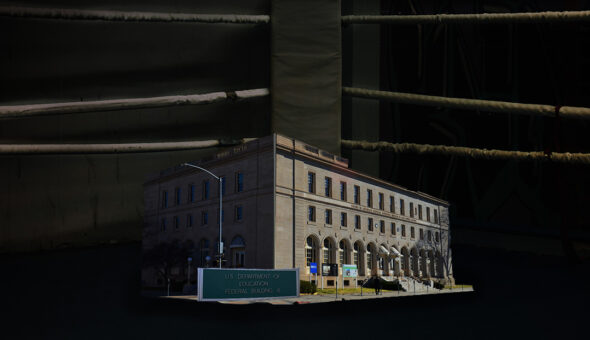Read the full transcript here:
Kevin Tyler:
Higher Voltage is brought to you by Salesforce. Today’s higher ed marketers face new challenges and must expand beyond traditional tactics to engage their many audiences. Learn how Salesforce empowers institutions of all sizes to unify first party data, build and measure targeted campaigns and deliver personalized messaging across channels. Visit salesforce.org to learn about how Salesforce can help your college or university achieve its goals.
Kevin Tyler:
Hello, and welcome to Higher Voltage a podcast about higher education that explores what’s working, what’s not, and what needs to change in higher ed marketing and administration. I’m your host, Kevin Tyler.
Kevin Tyler:
I’m very excited for today’s conversation with Kevin McClure. Kevin has been writing about the future of higher ed workforce for a couple of years now. We’ve invited him to join us for a conversation about what he thinks of the future of work looks like on college campuses moving forward. We’ll talk about the pandemic, the things that happened before the pandemic, and how institutions can move forward with creating an environment for success for their staff and faculty.
Kevin Tyler:
I’m glad to have you here, Kevin, we will post the articles that we’re using as reference points on our episode page. We’ll have another reminder for our listeners at the end of this episode. But before we dig into the conversation, I’m hoping you might be able to give us just some background about where you come from, what you’re doing, the institution you work at and how you got into this thinking about the future of work.
Kevin McClure:
All right. Definitely. Well, thank you so much for having me, and I’m just glad to be able to continue this conversation. I have been working professionally in higher education for over 10 years. Started my career at the University of Maryland in a staff role. After doing my doctoral work, entered into a faculty position. And so I teach and research and speak about, write about issues connected to higher education. Most of the stuff that I have worked on focuses on issues of leadership, communication, institutional management, and finance, so obviously the types of stuff that gets students really jazzed up. Usually, I have to convince them why taking my courses are important. And I have focus for many, many years now on regional public universities and other broad access institutions.
Kevin McClure:
Interestingly, prior to even some of the work that I’ve done on regional public universities as kind of a precursor to some of the stuff that I’m doing now, I did a lot of research focused on privatization in higher education. A big strain of that work was connected to basically questions of management, managerial authority, and labor conflict, kind of conflict within the organizational hierarchy of higher education.
Kevin McClure:
And so I did some research on that and at a very early point actually did some speaking on kind of what faculty looks like under institutions that are undergoing changes related to privatization. So I didn’t know it at the time, but that prior work has come in handy as I’ve entered into this new phase of my career, which has really shifted in unexpected ways and started really with the pandemic where I have focused intensively on the higher education workplace and have been writing about burnout, demoralization, under staffing, retention issues and benefit from being able to pull from kind of that previous background in organizational theory and finance and management.
Kevin McClure:
But I think what’s a little bit different about this as a topic for me and as kind of a new era in my career is that first of all, I’ve done most of my writing and most of my communicating about this through largely public channels. So columns in The Chronicle of Higher Education and EdSurge, keynote addresses, speaking with campuses as part of events, podcasts like this. And so that’s been one kind of unique dimension of it.
Kevin McClure:
But it’s also a much more personal topic to be honest with you. So I came about this because I reached a point in the pandemic where I was experiencing burnout. I realized that episode of burnout was probably my third or fourth go with it. And even after that first round of burnout, I have since had some moments of burnout. And through those experiences, as somebody with young children parenting through the pandemic, trying to still do everything and keep up with everything, perform at levels expected of me in higher education, a lot of folks just prompted some reevaluation of work in my life and prompted some questions around how we operate in higher ed, how we do things, how we structure our work had been fortunate to be able to learn from people who have been writing and studying this for a long period of time including in higher ed kind of piecing some things together and trying to shed light on issues that I think are really, really important.
Kevin Tyler:
That’s excellent. There’s been countless articles about the environments in which staff and faculty are working on college campuses. The burnout and the demoralization can come from different places or look differently depending on either what department or what your skillset is, what you’re teaching. Obviously, there are staff and faculty members who have left. Everyone’s heard about the Great Resignation, in higher ed specifically, have left because of racial tension issues, demoralization, overworking, doing too much, not enough people to help out with things. If you don’t mind sharing, what was your burnout looking like? Or what was it due to? And at this point, are you past that or are you still feeling that?
Kevin McClure:
Yeah, it’s a great question. So for me, it actually checked a number of the boxes that they kind of used to characterize burnout. So burnout traditionally is characterized as feeling exhausted or just kind of depleted on a regular basis. It’s also characterized by feeling a certain level of cynicism towards work. Or there may be a new opportunity, a new challenge that arises, but you just don’t have the bandwidth to be able to take that on. So for me, it was very much along those lines.
Kevin McClure:
What happened was in February of 2020, I was taking on projects and planning for spring, planning for summer without any sense of what was coming. And at that time, my kids were one and three. And so I was already kind of operating at a level of not a ton of sleep and just barely figuring out how to make everything work and how to accomplish everything in a given day. So fast forward just a bit, the pandemic really kind of enters the picture and we go into kind of quarantine mode. And so my wife and I are at home with our kids and we are splitting the days, half and half, attempting to try to get everything that we needed to get done with it about half of the work. And so it meant that we were often working evenings as a way of trying to get everything accomplished.
Kevin McClure:
And at that point in time, I didn’t have the insight to be able to say, “I need to dial back on some of these things. It’s just not going to happen.” And part of that was because we kind of thought that if we went into lockdown, we were going to arrive at a place shortly after that where we would kind of get back to normal, like that would fix it. And so I didn’t stop and say, “I shouldn’t do that writing project in the future, or I should say no to this new opportunity that popped up.”
Kevin McClure:
The other dimension of this is at that point in time, there was a lot of hunger for people to explain what was going on in higher education. They wanted to get a sense of what does closure mean? What are the ramifications of this decision? How should we be thinking about fall? So there were a handful of us that spent a lot of time thinking about higher education as organizations and how they should be organized and managed. And we were getting calls and emails constantly from people asking us, “What should we expect or what does this mean?” And so I said a lot, I guess, to a lot of those opportunities on top of everything else.
Kevin McClure:
And so I got to May, and we were thinking about graduation ceremonies for our students. One of my colleagues said, “Hey, we should do something kind of creative and fun and special to honor our students even though we can’t do our normal graduation ceremony.” And I just had nothing left in the tank. There was no creativity. I didn’t want to do anything more than just what was required to get to the finish line. And so my response at the time was, “Do we have to do that? Are we sure we have to do that?” And so for me that was a signal that there was something off because typically, under normal circumstances when I’m feeling good, I would’ve said, “Yes, that sounds great. Let’s brainstorm some ideas.”
Kevin McClure:
So I kind of went into a period then over the summer of hibernation. Once I got through that semester, I had the benefit of things slowing down in my schedule and I taught less and had fewer meetings. And so I had an opportunity during that time to catch my breath. We certainly were not out of the pandemic, but I was able to take advantage of that time to learn a little bit about what had happened, what may have caused it. And so the upside is that as I start lurching in that direction, again, in the future I’m much more readily able to identify what’s going on. I have a better vocabulary to be able to kind of express what’s happening and to kind of make changes before I get as far down the path as I did in that particular instance.
Kevin McClure:
As I’ve been learning about this and reading about it and talking about it with other people, part of what motivated me to start writing about this was not necessarily that I had this personal experience, but rather that in telling other people about it, I learned that there are so, so, so many other people that have had similar experiences in higher ed. And so that was really kind of what prompted me to start saying, “There’s a bigger conversation that needs to happen here.” It’s really yes, for me, the personal aspect of it is what pushed me to finally start moving in that direction and asking those questions. But the truth of the matter is that there’s people who’ve been experiencing burnout prior to the pandemic and there are people who’ve been asking really critical, important questions about working conditions in higher ed long before the pandemic.
Kevin Tyler:
Right.
Kevin McClure:
And so I’ve been a participant in this conversation recently, but in a lot of ways, it’s been going on for a long time.
Kevin Tyler:
I’m super curious. I work in higher ed marketing and have done that for a number of years. I’m curious what your thoughts are on this very public conversation about demoralization and burnout in higher ed and what that does, what that publicity does to the brand of higher ed as an idea, but also individual brands of higher ed, like campuses. Do you think that there’s an impact? Is it becoming next to impossible to hire people in this context of demoralization of burnout that we keep hearing about?
Kevin McClure:
Yeah, this is something that I have some tension around, because on the one hand I think this is a really important conversation, we should be having it, but it does raise that concern around by having this conversation by putting it out there by making it so public. Do we inadvertently make it so that people are more likely to leave or it becomes harder to bring people in? Where I’ve kind of landed on that by the way is that the fact that I’m having a conversation or writing a piece is not going to be the thing that pushes someone to leave their job.
Kevin Tyler:
Fair. Fair. That’s fair.
Kevin McClure:
So at the end of the day, we are talking about typically much bigger concerns that people have that is really the push factor or something much more material that the pull factor that’s really drive that conversation. But I do think it’s the case that the fact that this has become such a prominent public discussion has prompted people in higher ed, who are working in higher ed, to stop and say, “You know what? You’re right. There is something going on here. I have felt it for a long period of time, but I wasn’t exactly sure kind of what to do with that feeling or maybe I wasn’t sure if I was alone in feeling that. And now I realize that there are a lot of other people who are in this position.” And that having some additional awareness and understanding and a sense of connectedness to other people who have also been struggling may empower them to start looking into opportunities in a way that they wouldn’t have done previously and to maybe ultimately decide, “You know what? I’m going to start looking at something else. I’m leaving.”
Kevin McClure:
There is an open question amongst those of us that are educating future high professionals around whether the, not necessarily this conversation around burnout, demoralization is preventing or giving people reason not to come into our programs and pursue the field, but rather whether the experience of higher education itself for our students was not as positive as it once was and for that reason, they may say, “I’m not sure that I want to go into this as a career,” whereas they may have had more positive experiences and mentorship and relationships with staff and faculty that may have given them more reason to say, “I’d like to pursue this as a career.” So there is, I think, certainly some concern around whether we are… It’s not just concern. I mean, there is some factual… We have a real problem, I think, right now around attracting people to the field. And similarly, I think real problem around retaining people.
Kevin McClure:
Ultimately, I think having these discussions, figuring out the root cause of the problems and addressing those root causes is going to help to ensure that we are a place that is going to attract people into the future. And so I think it’s kind of necessary that we have these conversations.
Kevin McClure:
The question of how this may play out for like a particular institution is an interesting one. Let’s take the example of an institution that has had a high level of turnover for example. I don’t know that the fact that they are not retaining people or not attracting as many applicants is going to have huge ramifications for their reputation as an institution or the institutional brand, at least from the perspective of perspective students or maybe that particular audience. Because frankly, I think a lot of these conversations that were happening are happening in ways and through channels that the average family and student are just probably not going to catch [inaudible 00:15:29] and see.
Kevin Tyler:
Right.
Kevin McClure:
But I do have an open question, something that I have been wondering about. Surely students on campus are aware of and notice when there’s an office that’s then staffed or when services have been cut or there’s a facility that would typically be open that’s closed because they don’t have people to work there. It would be interesting to see if there comes a time where there’s been an institution that’s struggling. There’ve been stories of like Indiana University for example. It had some problems around being able to operate dining facilities. Michigan State University, similarly.
Kevin McClure:
And that type of thing would lead current students to be talking in conversation with family and friends. And then down the line perspective students say, “There’s something up there. This institution is struggling.” We, on the other side of the curtain, working at the institution then say, “Yeah, the problem is that working conditions aren’t great. Or the pay isn’t great. We’re not able to keep people. We’re not able to hire enough people to be able to deliver on the promise that has been offered up.” So like I said, this is kind of me speculating. I haven’t seen anything concrete that would suggest that there are students who are like, “Ooh, I’m going to steer clear of that place because I hear that there’re like a burnout factory for faculty and staff.”
Kevin Tyler:
Sure.
Kevin McClure:
But there is some potential, I guess, for there to be some connections there.
Kevin Tyler:
Yeah. And I think the reputation piece… And I agree with you, it’s not so much prospective students and their families as much as it might be new talent that they’re trying to bring in. I think that when a person leaves an institution for a reason like “There’s one of me and way too much work,” and that’s the root of the burnout, replacing the person isn’t necessarily the answer. It’s like building the team that the person who you replace needed in the first place, and just like swapping bodies doesn’t seem to be the solution. And so it’s more about if we are having such a hard time inviting ambassadors for our brand or finding ambassadors, hiring these people to be evangelists of this brand, I just feel as like it would be really, really hard to build a team, say, a marketing space, because of the structure within which these folks are working in. But I totally agree.
Kevin McClure:
In terms of attracting talent. I think you are 100% right in the sense that higher ed is a small world. When we even get down to the level of particular functional areas, it gets even smaller.
Kevin Tyler:
Totally.
Kevin McClure:
If you got somebody that leaves and they say, “Listen, this place was rough and this job is intense and they want to restructure it and add even more to it. We’re having difficulty hiring at lower levels,” that type of information, it has a way of getting out there. I do think that there have been some places in some searches where they have had difficulty filling positions because they want to just replace. They want to replenish and replace without changing anything connected to that position because in the past they’ve been able to do that. They’ve been able to find somebody who is willing to step into that role.
Kevin McClure:
I think that at least at the moment, workers have felt that they have sufficient agency and power within the labor market to say, “I’m not going to accept that. I’m not going to step into a role that I have heard is going to be a nightmare. I don’t want that for myself. I’m going to wait for a better opportunity. And by the way, I’m aware of the fact that there are places adjacent to higher education that might be willing to hire me and pay me more that don’t have these issues. And so I might be more interested in looking into those as opposed to what this institution is offering, which seems like it’s just kind of the same old. It’s more of the same.”
Kevin Tyler:
Right.
Kevin McClure:
So I think you were correct there 100% that when it comes to being able to attract kind of the next generation of talent or the next generation of leaders, we ought to be more concerned. And it would not surprise me to learn that there had been positions where it has been a struggle to fill them when that wasn’t the case in the past, because people that are eligible for that type of position, they know. They are knowledgeable about what the experience was of the person who was in it previously and they’re saying, “No, thank you.”
Kevin Tyler:
Right. I think it’s important to note here that people are calling this all types of different things, the Great Resignation and other terms thrown around about this, but this is not something that is specific to higher ed. It’s happening in other industries. I think that’s an important point to raise, although this is a higher ed marketing podcast. And so we’re going to talk about it in the context of higher ed. But I just wanted to make that point because sometimes we get emails from people about things.
Kevin McClure:
I had a really interesting exchange with somebody on Twitter that was actually pushing me and other folks that are writing about the higher education workplace to do a better job actually of being less insular and realizing that this space of higher education as a workplace is not as special or unique as we sometimes think that it is. Some of the problems that we’re talking about are not unique to higher ed. They exist elsewhere.
Kevin Tyler:
Sure.
Kevin McClure:
Some of the solutions that we should be implementing have been implemented with success elsewhere. The fact that we in higher ed can’t figure this out is a function of our insularity. And so I think there is some truth to that. So yes, as we’re talking about the Great Resignation in higher ed, one of the reasons why this has been a real issue in higher ed is because there are people who are leaving jobs in other sectors or shifting jobs in other sectors that are creating new opportunities for people in higher ed to step into those roles.
Kevin Tyler:
Right.
Kevin McClure:
And so I still think that the Great Resignation as a concept fits in many ways, but in a lot of ways, what we’re seeing is just a lot of movement and a lot of turbulence and uncertainty. And it has meant that some of the operating assumptions around the labor force that leaders have made don’t apply as cleanly anymore as they once did.
Kevin McClure:
The other thing that I think is really important as we’re kind of clarifying our language is there is not a singular higher education workplace or higher education workforce. So we’ve got incredibly different institutions with very different conditions and resources. And we’ve got incredible diversity of position types and power differentials within institutions, within organizations. And so you’ve got faculty that enjoy privileges and agency and decision making over their jobs that is not extended to staff. You’ve got folks that are in hourly roles that are maybe working at state institutions that are governed by a set of policies that make some workplace changes rather difficult to explore. We sometimes use these general categories as a way of trying to make sense of things, but the truth is that there is a lot of complexity at play here.
Kevin Tyler:
Definitely. Definitely. I know you’ve done a lot of research in this space and I’m wondering if there are any interesting insights or perspectives that you can glean from some of the data that you’ve looked at. I’m curious if more folks are leaving from specific skill sets or departments or race. Is there any sort of organization or any sort of trend that you can identify in what you’ve researched?
Kevin McClure:
Unfortunately, we don’t have great data that helps us to really understand what’s going on within the higher education workplace or even the higher education workforce. Most of the data that we do have available doesn’t get at the level of granularity that helps us to see some of those types of trends in patterns, at least across kind of higher education as a whole.
Kevin Tyler:
Sure.
Kevin McClure:
What I do have basically is just a lot of information and stories that kind of come to me by virtue of the fact that I’ve been talking about this or writing about it. And some of the data that I have seen within my own state system, what I have gleaned from that is that there is in fact levels of people that are switching jobs or leaving jobs in higher education that we haven’t seen before. Of course, this conversation around the workplace is happening at the same time that we are having conversations about the extent to which higher education is truly practicing some of the espouse values around diversity, equity, inclusion. And of course we are also well aware of long running problems in higher education, connected to racism, connected to discrimination or bias against mothers.
Kevin McClure:
And so from that and from what people have told me in DMS and Zoom conversations and emails is that there are people that have felt like they have been pushed out of higher education, and a lot of those are people of color. They are people that have felt stuck in their jobs because they had been passed over for advancement. They are parents or other caregivers. They are people with disabilities who feel that the workplace has been set up to allow for the success or to encourage the success of people that can meet a certain set of norms that were never designed to accommodate the way that they think or the way that they work. I think we may not yet have the numerical data to help us really see some of those patterns, but there is enough research out there that we can piece together who has, I think, been hurt the most in the higher education workplace and who has suffered the most through the pandemic as well.
Kevin McClure:
What that means for me is yes, having that data would be wonderful and is really, really important and I hope that we get at it. And I’m doing some work that will hopefully help us get at some of that, at least within kind of a sample of institutions. But, we know enough to understand that there’s a problem. We know enough at this point to understand where we ought to be targeting our attention most, so who are the people whose ability to thrive in higher education has been most curtailed. And so given what we know already, I think we have enough to say that there’s a problem that we ought to be acting on.
Kevin Tyler:
Yeah. Yeah. I like that we’ve spent some time talking about what people have been talking about for a minute, right? This Great Resignation, the demoralization, the burnout, even throughout the pandemic, before the pandemic. But now we start to hear these questions around what the future of work looks like especially on college campuses. And I really, really love the piece that you wrote about, and I’m just going to say University of Iowa because you’ve added a caveat about all the people you know who went to the University of Iowa. And so you weren’t trying to throw shade at the institution, but there were some things that you pointed out from the strategic plan that I just found to be really interesting and things that I think about as well. One of those things was about the idea of flexible work and how they talk about it in that strategic plan. We’ll have a link to this article on the episode page. But in a nutshell, it wasn’t exactly a flexible work kind of offer, right?
Kevin Tyler:
And so when we think about what higher ed is tasked to do, and that is to prepare people for the future of work, it also feels like higher ed is so hesitant to embrace the future of work. And I’m curious about why that might be.
Kevin McClure:
Yeah, it’s a great question. It is incredibly frustrating to be involved with organizations that are entirely organized around learning and human development and growth and to realize that there is so much resistance to undergoing processes that would help us learn from the pandemic in what we experienced and that we have done a really poor job of investing in the growth and development of our own people.
Kevin McClure:
I think my biggest fear, and so far I have not seen much to indicate that this fear is unfounded, is that every semester that we continue on, we are going to get closer and closer to reverting exactly back to where things were in January 2020, which is to say that all of the change that we experienced, all of the experimentation, the things that we have learned over the past couple of years are going to be lost because institutions are, I think in a lot of ways, structured and hardwired to revert back to a particular norm and are uncomfortable institutionalizing a set of changes even when it seems clear that they are beneficial to faculty and staff, but are enough of a radical idea to just run against the grain a little bit.
Kevin McClure:
And so part of the reason why that the University of Iowa plan stood out to me is that it suggested to me that we may see a fair amount of rhetoric around the future of work and we’re going to embrace innovation and we think flexibility is great, but by the way, our number one priority is providing a residential college experience for students. And that means that we expect people are going to be physically here. So there’ll be some workplace flexibility maybe, kind of depends on who you are and where you’re at and you’ve got to get approval for it. It kind of felt like we were kind of rhetorically jumping through these hoops to make it seem like this was the future of work, except that it really wasn’t. It wasn’t. It was the same workplace that people were probably accustomed to.
Kevin McClure:
Unfortunately, I haven’t seen that many examples of institutions that I feel like are really innovating and taking a chance on something different. Part of the reason why that confuses me so much is that there’s a really good opportunity here to be an institution and puts yourself on the map for being this place where we really value our employees. We pour into them, we believe in human growth and development. And by the way, we can show that in terms of how we understand our employees and what they’re seeking. We have groups dedicated to studying the workplace, collecting data on it, developing new initiatives. And through that data, we understand that flexibility is important so here’s what we’re doing.
Kevin McClure:
I guess I just find it surprising that there isn’t an institution that says, “Hey, there’s a strategy here for us to pursue that helps to differentiate us from other places and could have some really positive outcomes for the organization and for students.” And instead, I just feel like what we are doing is as time goes on walking backwards and kind of just hitting the rewind button instead of really learning from some of the lessons from the pandemic and putting in place permanent changes that are good.
Kevin Tyler:
I could not agree with you more on that. I think it’s interesting that we already have the processes to attract students in much the same way that we could use to attract faculty and staff. The ways that higher ed institutions talk about how they serve students, all the services, what we offer, what you get out of that, those are all messages that staff and faculty could also benefit from, right?
Kevin McClure:
Right.
Kevin Tyler:
Like, “This is what we stand for. This is who we are. This is who we’re looking for.” And that’s the power of a brand, right? The power of a brand is not just the recruitment piece, but it’s also students. It’s also how you understand who’s going to be a best fit as a leader, as a staff member, as whoever it is. And it just seems to be like really a missed opportunity for some really compelling messaging for a group of people who are delivering against your brand every single day.
Kevin McClure:
As I’ve been thinking about kind of this idea of marketing and communication, my experience as a faculty member is that I think a large chunk of our messaging and marketing is outward facing. And there’s probably a very good reason for that, right? That’s probably maybe the primary role of folks that are in a marketing position is to kind of tell the story externally.
Kevin Tyler:
Right.
Kevin McClure:
But the truth of the matter is that because of some of the disengagement and burnout and just the sheer disconnectedness associated with the pandemic, we’ve got a lot of people working in higher ed at institutions that don’t feel particularly tethered to the institution anymore.
Kevin Tyler:
Right.
Kevin McClure:
And all of us that work in higher education have a challenge in front of us, which is how do we rebuild those connections. And they don’t have to be the same connections. We don’t have to build them in the same way that they may have been built several years ago, but we’ve still got to think about how do we try to create a cohesive community of some sort after what we’ve just experienced. And so there’s, I think, a place potentially there for marketing, or if not marketing, at least storytelling to play a role in that to help us remember, this is what we’re all about, this is what we do well. And not just, “This is what we do well,” so that we can tell a prospective students so that they’ll come here, but as a way of celebrating the work that we do and the people who are here and helping to remind us of why we chose this place and why we stay here.
Kevin McClure:
Most departments at higher ed is not the case that the marketing folks have like a ton of resources at their disposal and they’ve got to make hard choices just like everywhere. But again, for leaders that are thinking about, “How do I rebuild this community? How do I get people engaged again?”, there could be some real value in putting some resources and putting the expertise of folks in marketing towards, or with an eye towards, helping to remind people affiliated with the organization of why we’re here.
Kevin Tyler:
Yeah. Yeah. I appreciate you mentioning the word innovation before, because I think you’re right, this is a really ripe opportunity for an institution to come out in front and say, “We are being innovative, and this is how we’re going to work moving forward.” Innovation is a word that’s tossed around higher ed. I’ve heard it a thousand times and maybe the last year, right?
Kevin McClure:
Right.
Kevin Tyler:
It’s just been like the top of mind for so many people. And the demonstration of that, especially in terms of the future of work on a campus, seems to not be as innovative as it could be. It’s also important to keep in mind the way employees select housing, especially in large markets like LA, right? So we have like in the valley, that’s where a lot of people who work at the state system live because it’s not as expensive as other places. But the commute is so long. And so you spend most of your life in your car, stuck in traffic, spending money on very expensive guests, especially nowadays. And there are other ramifications to not embracing what the future of work is going to look like. And I think those are the kinds of things that we also need to be talking about, the impact on staff workforce financially, because that’s a thing. That’s totally a thing.
Kevin McClure:
Yeah, 100%. There are a number of different variables that come into play with this. It’s not just, should we provide people that opportunity to zoom into this meeting? Should we provide an opportunity for them to work one day a week from home? People aren’t just making decisions based on the work itself. They’re making decisions about, as you said, what’s transportation costs look like, what a housing costs look like, how far does this salary actually go in this place.
Kevin Tyler:
Exactly.
Kevin McClure:
I’ve got to be honest with you. I’m not really convinced that most institutions have a great understanding of how their salaries match up to other places and other competitors. I don’t know that they’ve got a great sense of what it actually takes to live in a particular community based on what folks are generally making. Missing that information, not having that knowledge, I think eventually is going to catch up to an organization.
Kevin Tyler:
Oh, I totally agree.
Kevin McClure:
There are a number of people, myself included, who say there was a point in time historically when colleges and universities had a number of advantages as employers. Great benefits, a great deal of autonomy for some positions, maybe less stress during certain periods of time. A lot of those benefits just aren’t there anymore. The benefits aren’t as great as they used to be. There is perhaps less autonomy than there once was. There is no downtime. There is no low season anymore it feels like. The pressure is just there constantly. And so given that, institutions can’t really bank on the idea that they’ve got some sort of competitive advantage against the hospital down the road or the new startup, or the ed tech company that says, “We’re going to pay you great and you can work from anywhere.”
Kevin McClure:
And increasingly, those are our competitors. They’re not the community college that’s in town or the private college down the road. It’s this much bigger ecosystem of largely knowledge organizations. And not having a good sense of what the competition looks like can really create some problems. And I got to tell you, my students, some of my wonderful students that we have prepared to enter higher ed work, some of our very best brightest students, I go on LinkedIn now and they’re not working in higher ed anymore.
Kevin Tyler:
Right.
Kevin McClure:
They are working in healthcare. They are working in ed tech. I’m glad for them. I’m glad that they’ve had those opportunities. I’m glad that they’ve been able to translate their experience so that other places see value in what they can provide, but it’s a signal to me that higher ed doesn’t realize that there is some pretty stiff competition out there. Other organizations, other companies, I think do a much better job of thinking about and tracking how their pay looks compared to other companies and other organizations and what is necessary in order for somebody to be able to make a living and build a life in a particular place.
Kevin Tyler:
Yeah, that last piece that you just mentioned is one that resonates with me. I’ve been having this conversation basically with anyone who will listen. So I’ve worked in higher ed marketing for quite a while. Every time we ask a new client “Who are your competitors?” it is always, it is always other schools. I have not once heard someone say Google or Apple or TikTok. That is never part of the conversation. And as long as we limit our idea of competitors to other schools, we will never get ahead. Higher ed will never get ahead. So we have to look outside and come up with another message that makes clear that higher ed, this is where work happens, this is where you create a life, this is where you can be whatever you want. And then go to the Googles, the Apples and TikToks and serve them in a way that they could never have served you as a staff member, an employee. I think that that is part of what is missing in the conversation around higher ed, how it stacks up to other industries.
Kevin McClure:
Yeah. I don’t think any of us are saying either that we need to turn our universities into Google and make them-
Kevin Tyler:
Oh no, no, no, no, no.
Kevin McClure:
… properties and corporations. I think we can all recognize that there’s something special about our institutions. We see that there are certainly points of distinction and things that we want to be able to protect about an educational organization that sets them apart. I think we could do all those things while also saying we can make some simple updates and make sure that we are investing in our people and making sure that we don’t have dead end jobs and that there’s professional development and growth opportunities and-
Kevin Tyler:
And balance.
Kevin McClure:
And balance. Right. Which will allow us to be much more competitive as a knowledge organization amongst many other knowledge organizations. So I don’t think that what we’re talking about here necessarily is completely revolutionizing or changing or privatizing institutions. I think what we’re talking about is on some level making some updates in some cases to old policies to being open, to trying something a little bit different, to being much better about gathering data and to not take for granted that people make a choice to work at a particular place.
Kevin McClure:
For so long, I think higher ed has just been able to lean on the idea that if we lose somebody, we can easily replace them.
Kevin Tyler:
Right.
Kevin McClure:
First of all, I think that that’s true in some places and true for some positions, but not others. But I’m also just tired of that. I’m tired of that as a logic for an organization. And I think that we can do so much better. Especially as places that are supposed to be focused on learning and development, we shouldn’t have the mindset of, “Well, if we lose somebody, we just replace them without changing anything.” We should be stopping and saying, “We lost somebody really talented. What happened there? How do we restructure things? How do we invest differently so that doesn’t happen again?”
Kevin Tyler:
Yes. Yes. You made a very good clarification. I am not in any way advocating for the privatization or becoming a tech company or anything else, but understanding how they are attracting the people that we are trying to attract is going to be a very helpful piece of data in order to make better decisions.
Kevin McClure:
Well, and in your case, you’re in a space, and there are multiple spaces like this within higher education in particular, where the skillset that you have is obviously transferable to lots of different places. And so, 100%, you all are absolutely competing against a whole slew of other types of places when it comes to attracting talent. Sometimes I feel like higher ed is kind of like, “Yeah, we understand,” but it’s like, “But do you? Do you understand?”
Kevin McClure:
I just saw actually an article about this recently at the community college level, they were trying to hire an instructor of cyber security. There are some real constraints when it comes to the salaries at a public institution for example. And so they just can’t never find somebody because the people who are in that field are like, “This is not even close to what we can expect to earn.” You want to be in this space. If you want to have somebody that’s a professional marketer that’s a leader in this space and really creative, you can’t necessarily use the same salary bands that you would use for other types of positions. That’s just not going to work.
Kevin Tyler:
Yeah. Yeah. There’s so much to think about in this space. I’m curious what you think happens next. Do you imagine there being an institution that comes out and says, “This is how we’re going to do things” and it’s much different and take that risk? Or is it just too much to risk right now with all of the factors that are impacting the industry right now? Is it not a priority? What do you think is next?
Kevin McClure:
I am not super optimistic that there are going to be sweeping changes. Unfortunately, I am worried that all of this momentum around wellbeing and balance and supporting employees is going to get passed up because of concerns around the economy and the potential for a recession and political conflict and violence and figuring out how to maintain enrollment given the way that society is at the moment. I would say that I would love, love, love, love to see the level of enthusiasm around this conversation continue and for it to lead to some real initiatives and some real changes. I already feel like it’s starting to cool off a little bit to be honest.
Kevin McClure:
I hate that. I wish that I had a sense that we were really moving in a positive direction and maybe it’s going to take more than just the types of conversations that we’ve been having on it so far. We’ve got to have people who are willing to lead the way and provide an example and put some real resources behind it. There might be some places that are doing that and putting some real thought into it. I’m still looking. Even though the conversation has cooled, I haven’t cooled on it yet. I have three years ahead of me where I’m supposed to be researching this intensively and writing a book about it. Hopefully through that, we might be able to make sure that people don’t lose sight of it entirely, but this topic is competing for oxygen with a lot of other really serious issues. And I can see given the track record in higher ed how it would be very easy for us to just move on from it.
Kevin Tyler:
Yeah. Yeah. Before we close, I’m curious if you could run down a short list of the things that you think institutions should be thinking about in thinking about the future of work. What are the things that feel like new ways of doing things that might have some value in the way work looks next?
Kevin McClure:
We need to, I think, revolutionize the way we think about human resources to make sure that we are actually thinking strategically about talent management and human development. We need to do a much better job of analyzing workload and putting in guardrails to ensure that people are protected from the possibility of work consuming our lives. We need leaders who themselves take this seriously and have not spent so long themselves as workaholics that they view that as the norm accordingly or willing to see a different path forward for maybe a new generation of people that don’t have to sacrifice everything in order to step into leadership positions. We need to do a much better job of collecting data on workplace culture and acting on that data. So those are some of the things that I have brought up in the past and will continue to bring up and ideas that I’ll hopefully continue to develop in ways that are more concrete.
Kevin McClure:
I remain convinced despite my pessimism around kind of where this conversation is going, that this is actually something that we have within our capacity, within our expertise. We have the ability to make some real change in this area. This isn’t the type of problem that I think is something that we can’t fix.
Kevin Tyler:
Right. I would agree. Kevin McClure, been a pleasure chatting with you. Thank you so much for joining us today on Higher Voltage. I really appreciate you taking the time. Like I mentioned, we’ll have a number of Kevin’s articles on our episode page for folks who might be interested in reviewing those. Thank you so much.
Kevin McClure:
Yeah. No, it’s been fun. We should do it again.
Kevin Tyler:
We likely will, depending on what happens next. Awesome.
Kevin Tyler:
That’s it for this week’s episode of Higher Voltage. We’ll be back soon with a new episode. And until then, you can find us on Twitter, @volthighered. And you can find me Kevin Tyler on Twitter, @Kevinctyler2.









